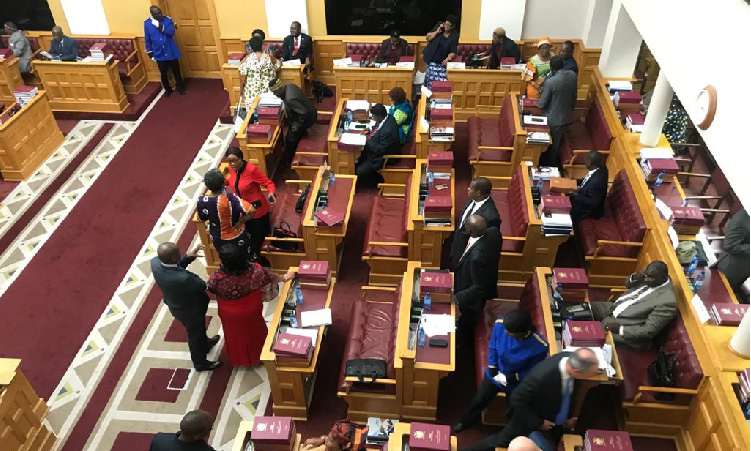ROBUST and rigorous management of Namibia’s energy supplies is required to prevent shortages from hampering economic growth.
This is the view of Johannes !Gawaxab, Managing Director of Old Mutual’s African Operations, when he responded to questions about the accumulated losses of N$206 million of Namibia’s National Energy Fund. He said modern and relevant management – as opposed to archaic and outdated methods – of the National Energy Fund was a prerequisite to avoid Government having to make transfers to the National Energy Fund and also to manage the volatility of fuel prices in Namibia.He said the National Energy Fund needed to engage expert resources to manage the volatility of the oil price, as well as fluctuations in the exchange rate, to reduce accumulated losses and ensure that the Fund was self-sustainable.!Gawaxab said global oil prices were likely to be at higher levels for longer and were expected to remain volatile.Demand appeared to be the primary driver in the volatility of the global oil price, rather than supply shocks experienced previously.”The world looks set for a synchronised upturn in global industrial production.South East Asia, particularly China and India, are major importers of fuel to boost industrial production and demand for oil is unusually high.During 2003/04, China’s oil demand growth outstripped its GDP growth,” he said.He said supply constraints were also affecting the volatility of the global oil price.”In addition to geopolitical tensions, the gap between the discovery of new oil reserves and global oil consumption is growing, which means that oil wells are rapidly exhausted.”!Gawaxab welcomed Government’s budgetary allocation to NamPower.He said it was imperative for Namibia to speed up its investment programme significantly in a bid to meet growing and increasing energy demand as well as avoiding disruptions and blackouts.”Improved energy security, including the establishment of storage facilities for dealing with emergencies, and the robust management of the volatility in the oil price, would go a long way in ensuring sustained economic growth,” he said.Last week, Mines and Energy Minister Erkki Nghimtina said Government was under pressure to compensate oil companies for petrol imports during 2005, because they had sold it for much less than the cost of bringing it to Namibia.The National Energy Fund will receive N$50 million from the 2006-07 National Budget to help plug the gap.Nghimtina said Government could not allow itself to be caught in the same position this year and would continue to monitor and adjust prices in line with the cost of importing petroleum products.He said the import of fuel from countries other than South Africa was already being considered to avoid any future shortages from spilling over into Namibia.In the long term, he said Government planned to secure supply by enforcing mandatory stockholding levels.Over the next three years, Government will contribute N$750 million to the development of a gas-fired power station at Oranjemund – Kudu Gas.Nghimtina said his Ministry was also committed to ensuring an interconnection between Zambia and Zimbabwe to increase Namibia’s chances of engaging actively in regional electricity trading.He said modern and relevant management – as opposed to archaic and outdated methods – of the National Energy Fund was a prerequisite to avoid Government having to make transfers to the National Energy Fund and also to manage the volatility of fuel prices in Namibia.He said the National Energy Fund needed to engage expert resources to manage the volatility of the oil price, as well as fluctuations in the exchange rate, to reduce accumulated losses and ensure that the Fund was self-sustainable.!Gawaxab said global oil prices were likely to be at higher levels for longer and were expected to remain volatile.Demand appeared to be the primary driver in the volatility of the global oil price, rather than supply shocks experienced previously.”The world looks set for a synchronised upturn in global industrial production.South East Asia, particularly China and India, are major importers of fuel to boost industrial production and demand for oil is unusually high.During 2003/04, China’s oil demand growth outstripped its GDP growth,” he said.He said supply constraints were also affecting the volatility of the global oil price.”In addition to geopolitical tensions, the gap between the discovery of new oil reserves and global oil consumption is growing, which means that oil wells are rapidly exhausted.”!Gawaxab welcomed Government’s budgetary allocation to NamPower.He said it was imperative for Namibia to speed up its investment programme significantly in a bid to meet growing and increasing energy demand as well as avoiding disruptions and blackouts.”Improved energy security, including the establishment of storage facilities for dealing with emergencies, and the robust management of the volatility in the oil price, would go a long way in ensuring sustained economic growth,” he said.Last week, Mines and Energy Minister Erkki Nghimtina said Government was under pressure to compensate oil companies for petrol imports during 2005, because they had sold it for much less than the cost of bringing it to Namibia.The National Energy Fund will receive N$50 million from the 2006-07 National Budget to help plug the gap.Nghimtina said Government could not allow itself to be caught in the same position this year and would continue to monitor and adjust prices in line with the cost of importing petroleum products.He said the import of fuel from countries other than South Africa was already being considered to avoid any future shortages from spilling over into Namibia.In the long term, he said Government planned to secure supply by enforcing mandatory stockholding levels.Over the next three years, Government will contribute N$750 million to the development of a gas-fired power station at Oranjemund – Kudu Gas.Nghimtina said his Ministry was also committed to ensuring an interconnection between Zambia and Zimbabwe to increase Namibia’s chances of engaging actively in regional electricity trading.
Stay informed with The Namibian – your source for credible journalism. Get in-depth reporting and opinions for
only N$85 a month. Invest in journalism, invest in democracy –
Subscribe Now!









